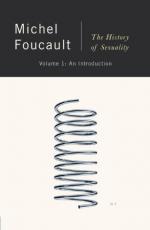
|
| Name: _________________________ | Period: ___________________ |
This test consists of 15 multiple choice questions and 5 short answer questions.
Multiple Choice Questions
1. What were the effects of the power exercised over sexuality in the nineteenth century?
(a) It was successful in making the topic of sexuality taboo.
(b) It created a multiplication of singular sexualities and pleasure power spirals.
(c) It set practicable boundaries for sexuality.
(d) It set up a barrier against sexuality that was too rigid and provoked a backlash.
2. What does Foucault say about the ritual of confession?
(a) The expression of truth produces intrinsic modifications in the confessor.
(b) It creates truth in lieu of simply expressing it.
(c) It is a vanishing ritual in western society.
(d) It is fundamenal human nature.
3. What is the relationship between pleasure and power?
(a) They cancel each other out.
(b) They turn against each other.
(c) They are polarized.
(d) They seek out, overlap, and reinforce one another.
4. What was the focus of the codes of sexual conduct up to the end of the eighteenth century?
(a) Perversions.
(b) Extra-marital sex.
(c) Children.
(d) Married couples.
5. Per Foucault, what does our tone of voice tell us when we speak about sexuality?
(a) That we long for more understanding and help.
(b) That we derive sexual pleasure from it.
(c) That we are ashamed of our sexuality.
(d) That we feel we are being subversive.
6. What is the central question Foucault wishes to address?
(a) Why are we still repressed?
(b) What is the path out of repression?
(c) How did we come to be repressed?
(d) Why do we say that we are repressed?
7. What reason does Foucault give for modern society being perverse?
(a) It is from a backlash provoked by hypocrisy.
(b) It is the result of erecting too large a barrier against sexuality.
(c) It is in fact, directly, perverse.
(d) It was created by the imbalance of power mechanisms and sexuality.
8. What did the author of "My Secret Life" write about?
(a) Secrets told to him by friends.
(b) Sexual acts he heard in confession.
(c) A scrupulous and detailed account of his sexual episodes.
(d) The horror he felt at some of his sexual desires.
9. What can be said about the discourse on sex Foucault sets forth?
(a) It is a multiplicity of discourses produced by a many mechanisms and institutions.
(b) It is symptomatic of repression.
(c) It is an attempt to purge unwanted desires.
(d) It is constrained to the educated and powerful population.
10. What factor supported and relayed the discourse on sex to become an essential component of society?
(a) Sensibility to new sexual boundaries.
(b) Public interest power mechanisms.
(c) A collective curiosity.
(d) A new mentality.
11. What effect did the classification of perversions have?
(a) It suppressed the practices almost into nonexistence.
(b) It gave the practices an analytical, visible, and permanent reality.
(c) It caused more of the population to confess their unpopular desires.
(d) It created a system by which doctors were succesful at treating people with undesireable sexual habits.
12. The medical examination, the psychiatric investigation, the pedagogical report, and family controls can be said to be characterized by which of the following?
(a) The domination of authority figures and the repression of sexual practice.
(b) Perpetual spirals of pleasure and power.
(c) Anxiety and domination.
(d) The effective practice of removing sexual impetus.
13. What happened to the penal and legal codes relating to sexual offenses in the nineteenth century?
(a) The codes transferred from a religious base requiring exorcism to a legal base requiring reform.
(b) The severity of the codes diminished greatly and often deferred to medicine.
(c) The effectiveness of the codes was considered the battleground against vice and evil.
(d) The codes were recognized by the church as a great moral necessity.
14. Which public institution undertook to classify and manage all forms of "incomplete" sexual practices?
(a) The law.
(b) The government.
(c) The church.
(d) Medicine.
15. What is Foucault NOT claiming to search for instances of?
(a) Production of power.
(b) Instances of discursive production.
(c) Propagation of knowledge.
(d) Liberation from repression.
Short Answer Questions
1. Which is the form Foucault uses to define the relationship between power and pleasure?
2. What does Foucault NOT say was true about the science of sexuality before Freud?
3. Toward the beginning of the eighteenth century, in which of the following areas was there NOT an incitement to talk about sex?
4. What does Foucault say has happened to sexual discourse?
5. How did the scheme for transforming sex into discourse become a rule for everyone?
|
This section contains 778 words (approx. 3 pages at 300 words per page) |

|




